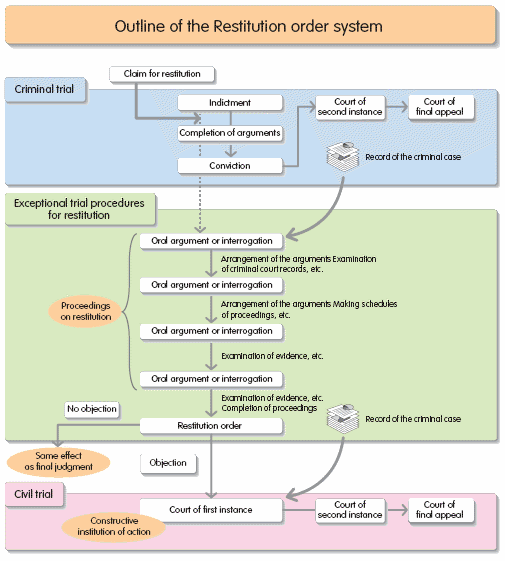

After the public prosecutor has made the indictment, trial will take place in court. The public prosecutor will submit evidence to prove the case and will examine the witnesses to seek fair punishment.

The court can decide not to disclose the names and other information of victims of sexual offenses and other offenses in open court. When such decision is rendered, court proceedings including reading of the indictment will be carried out in a manner not disclosing the information of the victim. Should you require such protection, please ask the public prosecutor in charge.

In order to prove the offense, witnesses are called to testify in court. For example, victims will be asked to testify about the harm they have suffered and their feelings toward the defendant. Eyewitnesses will be asked about the crime or the accident they witnessed.
 |
I explained what happened to the police and the prosecutor and made a statement. Do I really have to testify again at court? | |
 |
Generally, the written statement at the police station or the Public Prosecutors Office cannot be submitted to the court as evidence if the defendant makes an objection. In such situation, it is necessary for the victim or a witness to testify at trial to prove the circumstances of the case. In addition, it is often better to have the judges hear the victims directly so the judge can get a better understanding of the victim’s suffering. We hope you will understand why we ask the victim or the eyewitness to testify. |
|
 |
I was the victim of a sex crime, and I am very nervous about testifying in front of my perpetrator. Is there anything that can you can do to help me? | |
 |
We take the following measures to ease the burden of those who have to testify at court: |
|

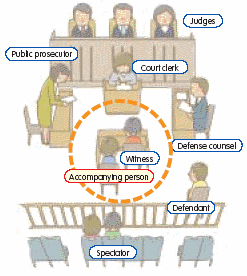
Victims of sexual offenses, children and other people sometimes feel great nervousness or anxiety when they testify in a criminal court. To ease such feelings, family member, psychological counselor or other person can accompany the witness when testifying.

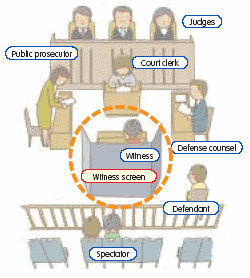
In order to lessen the psychological pressure people sometimes feel when testifying in front of the defendants or a spectator, witness can be screened off from the defendant and spectator when giving testimony so that the witness will not be distracted by them.

For victims of sexual offenses and others for whom appearing in front of everyone involved in the trial in the courtroom would be a severe psychological burden, the person testifying can sit in a separate room in order to ease the pressure they feel. This room will be connected by a cable to the courtroom, allowing the witness to give testimony over a monitor.
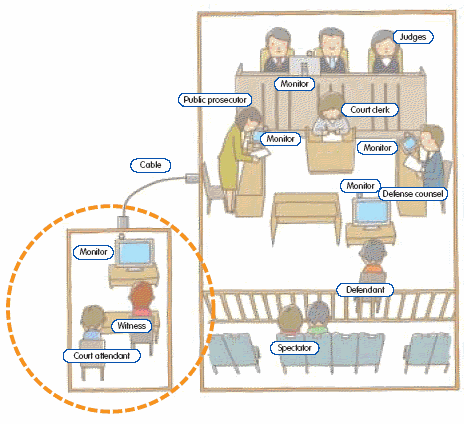

Since trials take place at public courtrooms, spectator can attend them. There is a system in place that gives victims and their bereaved family’s priority attendance at trials.
 |
Can you explain about the priority attendance systems for victims and others? | |
 |
In cases of high public concern where many are expected to attend the trial, admission tickets must be allocated by drawing lots. However, the court gives as much consideration as possible to securing seating for victims, their bereaved families and other such persons. Where victims and their bereaved families wish to attend the trial, and a high number of spectators is expected, please consult in advance with the court, the public prosecutor, public prosecutor’s assistant officer or victim support officers handling the case. 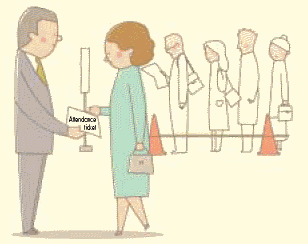
|
|

Victims, family member and bereaved families naturally have a strong interest toward the facts the public prosecutor intends to prove in court.
Accordingly, if the victim, family members and bereaved families desire so, a written opening statement will be delivered if the prosecutor has prepared the opening statement in writing and submitted it to the court. As a general rule, such documents can be delivered once the opening statement is completed. Should you desire such documents, please ask the public prosecutor in charge of the case or a Victim Support Officer.

There is a system allowing victims and their bereaved families to inspect and photocopy records made during the trial.
 |
Please explain about the system which allows inspection and photocopying of trial case records? | |
 |
If victims and their bereaved families make a request, they are, as a general rule, allowed to inspect and photocopy the trial case records that are kept at court during the criminal case, unless such request is deemed to be made on unreasonable grounds or is acknowledged as inappropriate. Should you require such access to trial case records, please ask the court. Victims and their bereaved families of similar crime may also be allowed to inspect and photocopy the trial case records, if it is acknowledged as appropriate and necessary to make the claim for damages. Should you require such access to trial case records, please ask the public prosecutor or public prosecutor’s assistant officer in charge or Victim Support Officers. |
|

This is a procedure which allows victims and their bereaved families to express their opinions in court.
 |
What is the procedure for the victim to express their opinion in court? | |
 |
When a victim or their bereaved family wishes to express their feelings about the harm they suffered or wishes to express their opinions about the crime, they can express their feelings or opinions through this procedure. In this way, the trial can proceed more clearly in line with the feelings and wishes of the victims. Also, by giving the defendant the opportunity to directly hear the feelings and opinions of victims and their bereaved families, they will be given a chance to reflect on their actions. Previously, victims’ families were allowed to express their opinions only when the victims were deceased. Now, they are allowed to express their opinions even in the case where victims suffer serious damage mentally or physically. Should you wish to express your opinion, please ask the public prosecutor in charge. Please refer to “Victim Support during Trials” for systems of victims and family participation in criminal trials. 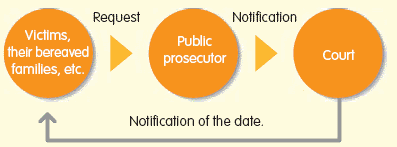
|
|

This is a system which allows victims and their bereaved families to directly participate in criminal trial proceedings.
 |
Tell me about the victim participation system. | |
 |
This is a system where victims and their bereaved families of certain cases can participate in criminal trials by attending trials and questioning the defendants. Victims and their bereaved families who are allowed to participate in criminal trials are called “victim participants.” |
|
 |
Who is eligible? | |
 |
Victims of cases of intentional criminal act such as murder or bodily injury, or victims of crimes of rape, forcible indecency, illegal arrest/confinement, or bodily injury or death caused by negligence while driving, and such victims’ spouse, direct families or siblings if the victims are deceased or suffer serious damage mentally or physically |
|
 |
What is the procedure to participate in criminal trials? | |
 |
Victims and their bereaved families shall ask the public prosecutor in charge for participation in criminal trials. The public prosecutor will notify the court along with the opinion on whether the victim should participate. |
|
 |
Will participation be guaranteed if requested? | |
 |
If the court, after hearing opinions of the defendant and the defense counsels and considering the nature of the crime, relations with the defendant, and other circumstances, deems that the person should be permitted, he or she can participate in the criminal trial as a victim participant. Even in cases where a person has been permitted to participate, not all procedures are open for participation. |
|
 |
What can victim participants do in criminal trials? | |
 |
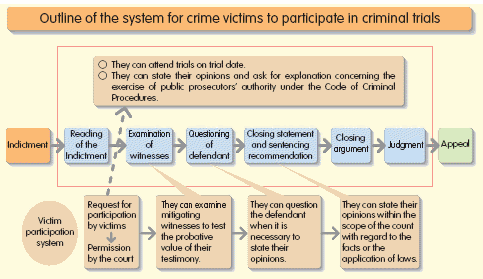
|
|

In order to ensure proper and effective participation of victims permitted to participate in criminal trials, there is a system where the State bears the remuneration and costs for attorneys so that participants lacking financial resources can also receive assistance of attorneys.
 |
When can victim participants use state-appointed attorney service? | |
 |
Victim participants can delegate to an attorney, such acts as attending trials on trial date and questioning of the defendant. If their financial resources are less than 1.5 million yen (cash and deposits; if any costs for treatment due to the criminal acts needs to be paid within three months, such costs will be deducted), they can request the appointment of an attorney (referred to as an “attorney for victim participants”). Should you require the appointment of such attorney, please ask the Japan Judicial Support Center (Houterasu). Telephone: 0570−079714  |
|

In criminal procedure, there is also a settlement procedure with the same effects as in civil proceedings.
 |
What is a settlement in a criminal proceeding? | |
 |
Upon request, where an out of court settlement has been reached between the defendant and the victim, his or her bereaved families and/or other parties concerning a civil claim for loss or damages relating to the offense, the criminal court handling the criminal offense can enter details of such agreement into trial records. This entry into the trial records has the same effect as agreement reached during civil proceedings. Should the defendant fail to keep the terms of the settlement and fail to pay the compensation, the victim, his or her bereaved family or other parties can, without starting a civil action, use the entry in the trial records and initiate compulsory execution of the settlement. For certain serious offenses, a claim for damages against the defendant can be filed with a criminal court. (For details, please refer to “Restitution order.”) 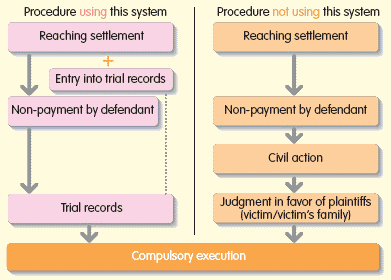 |
|
* Please refer to “Civil actions” for information about civil actions.

There is a system to settle disputes simply and promptly by using the outcomes of criminal procedures. This is an exceptional procedure for the victims and their bereaved families to claim restitution and is an accompaniment of criminal procedure.
 |
Please explain about the restitution order system? | |
 |
During the period between indictment and the completion of arguments, victims or their heirs of cases of an intentional criminal act such as murder or injury can make a request to the criminal court to issue a restitution order against the defendant. This request will be to claim compensation of damages caused by the offense mentioned in the indictment. The criminal court having received such request will look into it after the criminal case is convicted. The court will reexamine the record of the criminal case, conclude the hearing within four hearing dates, and will rule on the merits. If any objection is filed against the court’s ruling by either side of the parties, ordinary civil procedure will commence (even in such cases, the necessary record of the criminal case will be sent to the civil court). Under this system, the criminal court will take charge of the civil restitution proceedings. By examining trial records and utilizing the outcome of the criminal trial, victims and their bereaved families will be able to prove the fact of their damages more easily. Furthermore, the basic focus will be placed on the amount of damages, which will simplify and facilitate the process. This system is available with only a fee of 2,000 yen. Even if the case is sent to civil court, the trouble of submitting photocopies of case records can be omitted. This system is designed to ease the burden of victims and their families seeking restitution. | |
